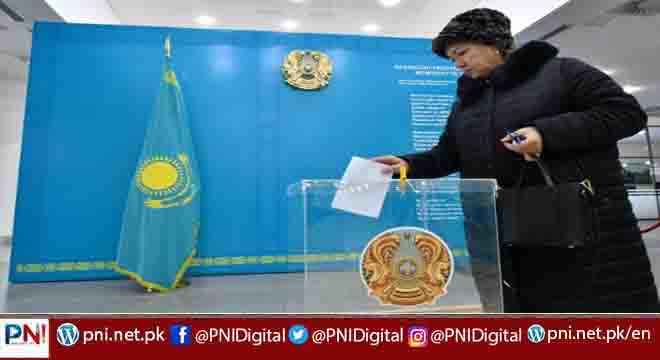Almaty, Kazakhstan, Nov 20 (AFP/APP):Kazakhs on Sunday voted in presidential elections expected to cement incumbent Kassym-Jomart Tokayev’s grip on power, months after deadly unrest spurred a historic shift in the Central Asian country.
At 1200 GMT, three hours before the 10,000 polling stations in the country closed, the turnout stood at 67.85%. First exit polls are expected at 1800 GMT.
The victory of President Tokayev, who voted early on Sunday in the capital Astana, is all but a foregone conclusion as the 69-year-old is facing no real opposition.
Authorities detained around 15 protesters demanding free and fair elections in the country’s largest city Almaty, AFP journalists witnessed.
Last January, the vast former Soviet republic sank into chaos during protests over high living costs which left 238 dead.
Kazakhstan has since then stabilised but tensions persist, as shown by the arrest on Thursday of seven opposition supporters accused of an attempted coup.
Tokayev — once a steady hand known for lacking charisma — showed a ruthless side earlier this year by violently suppressing protests.
Hoping to turn over a new leaf, Tokayev said he sought a “new mandate of trust from the people” in this election.
– No competition –
AFP journalists saw voters taking selfies in front of the polling stations in Astana the economic hub of Almaty, but this was not a show of excitement.
Many said they would be “required” to show it when going back to work on Monday.
If Tokayev announced reforms, the promised “new Kazakhstan” feels like a deja-vu, with a deserted political landscape, hardly credible opposition and political pressures.
Critics are still sidelined and all five of Tokayev’s competitors are virtually unknown.
This left 19-year-old student Alya Bokechova thinking that going to the polls “would be a loss of time”.
“We already know who will win and we don’t know the other candidates,” she told AFP.
But his promises of democratic and economic reforms resonate with some voters.
Voting for Tokayev, police officer Nurlan N. said “Since independence 30 years ago, almost nothing changed, I would like to see some significant changes.”
Casting her ballot in Almaty, 68-year-old pensioner Murzada Massalina said “Tokayev is the suitable candidate because he has a lot of experience.”
Just days before the vote, seven people linked to exiled opponent Mukhtar Ablyazov were arrested over accusations they were planning a coup.
Tokayev also said glorifying those who took part in the January protests was “unacceptable”.
Observers from the Organisation for Security and Cooperation in Europe (OSCE) criticised Kazakhstan’s failure to meet electoral recommendations, including “conditions of eligibility and registration of candidates”.
– Hoping for a change –
Tokayev came to power in 2019 after winning 70 percent of the vote in an election whose outcome was inevitable after he obtained the backing of former ruler Nursultan Nazarbayev.
For the following two-and-a-half years, he played a role of loyal protege.
But that changed after protests erupted in January and Tokayev ordered law enforcement to “shoot to kill” demonstrators.
Tokayev then distanced himself from his former mentor Nazarbayev, purged his clan from positions of authority and promised a “new and just Kazakhstan”.
He announced reforms, a constitutional referendum and introduced single presidential terms of seven years.
The Kazakh leader also stood up to Russia’s Vladimir Putin, as Moscow’s invasion of Ukraine shocked former Soviet republics.
The offensive reawakened Kazakh concerns that Moscow may have ambitions on the north of the country, home to three million ethnic Russians.
In response, Tokayev strengthened his country’s ties not only with China, but also with Europe.
The leaders of Turkey and China visited Kazakhstan, as well as many high-ranking European officials and Pope Francis just this year.
Tokayev also directly clashed with Putin on a visit to Saint Petersburg in June.
He said Moscow’s move to recognise Ukrainian separatist regions — that it has since claimed to annex — would “lead to chaos”.
Follow the PNI Facebook page for the latest news and updates.









